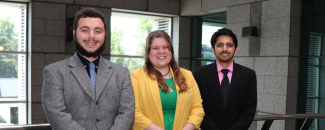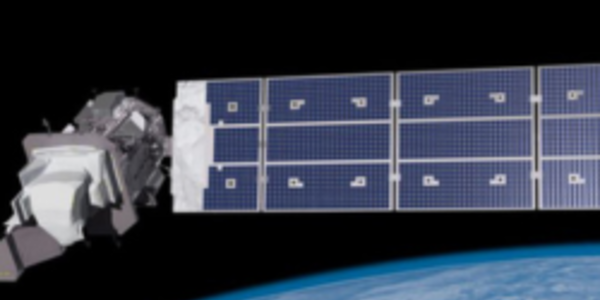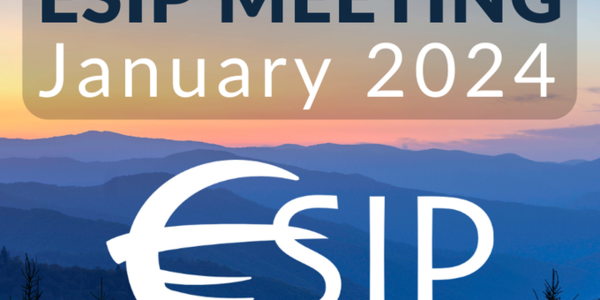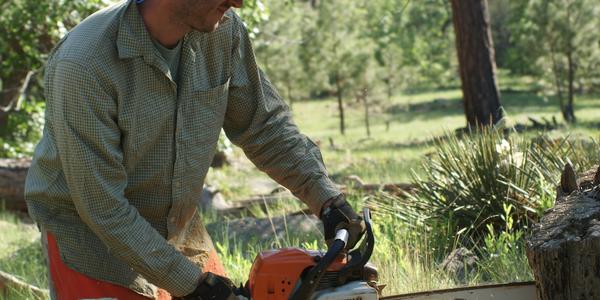Summer projects focus on drought, hurricanes, soil moisture, and more

Touching on a wide range of subjects, young scholars work with NOAA over the summer to partner with state and local organizations on research projects that can be applied to real-world issues.
Several national programs station early-career scientists and college students at NCEI under the mentorship of scientists. Candidates for summer work come from NASA DEVELOP, the NOAA Hollings Scholars program, and our cooperative institutes. Their summer research uses environmental data and NOAA expertise to develop useful applications for states, economic sectors, such as farming, and many types of organizations.
NASA DEVELOP
NCEI’s five-year relationship with NASA DEVELOP fosters projects that utilize NASA environmental satellite data with climate data from NOAA. This summer, the team is focusing on characterizing soil drydown parameters for drought mitigation in cropland and rangeland of Kansas. The three-member team is partnering with the Kansas Water Office, the Office of the State Climatologist at Kansas State University, and the Desert Research Institute at the Western Regional Climate Center.
The project, using remote sensing data and drought indices, will help the partners answer the question, “Given current soil moisture and surface conditions, when will soil moisture reach critical dryness if there are 5, 10, 15, or more days without precipitation?” Members of the team (pictured above) include:
Max Dunsker, a graduate of the University of California, Los Angeles. He majored in Economics and International Development Studies with a minor in Geospatial Information Systems and Technology. For his honors thesis, Max analyzed the potential effects of agro-industrial versus smallholder oil palm production in sub-Saharan Africa, using raster imagery to understand site suitability and potential yield while developing tools to empower national governments to create a sustainable oil palm sector.
Danika Mosher, a graduate student at East Tennessee State University, majoring in Geosciences and concentrating in Geospatial Analysis. Danika has been able to combine multiple research interests such as ecology, weather, and climate throughout her field experience and academic pursuits. Her thesis analyzes how spruce-fir forests in the Southern Appalachians respond to climate change. She has also used citizen science weather stations to observe annual change in snowfall around North Carolina ski resorts.
Krishna Tiwari, a graduate of Western Carolina University (WCU) who majored in Environmental Science and minored in Anthropology. Krishna was part of a volunteer organization known as Eco C.A.T.S. (Campus Awareness Team for Sustainability) as well as a project manager for the Sustainable Energy Initiative and an intern at the Office of Sustainability and Energy Management. At Western, he also worked on was the Campus Tree Identification Project to map species of trees on campus for maintenance and sustainability purposes. Through that project, he and the team acquired Tree Campus USA Certification for WCU.
Hollings Scholars
The Hollings Scholarship Program began in 2005 and is named in honor of former U.S. Sen. Ernest F. Hollings of South Carolina. It recognizes outstanding undergraduates studying in fields that support NOAA’s mission. Each year, about 130 undergraduate students become Hollings Scholars and work on projects in many disciplines across NOAA locations.
At NCEI, our Hollings scholars include:
Candela Cerpa, an undergraduate from University of Maryland–College Park. She completed a research project "Historical Tsunami (1849-2018) Effects Near the New Hebrides Trench," studying tsunami impacts around Vanuatu and New Caledonia in the South Pacific. She updated the Global Historical Tsunami Database with historical tsunami data for the New Hebrides Trench area and produced a series of eye-catching, informative maps using ArcGIS Pro.
Sabrina Curtis, a senior at Michigan State University majoring in Geological Sciences with a minor in Computer Science. Her project involves reconstructing past temperatures using paleoclimate proxy data (e.g. ice cores, pollen, ocean sediments, etc.) to create a global map of the change in temperature between 6,000 years ago and present. Currently reconstructed temperatures and modeled temperatures throughout the Holocene (the last 12,000 years) disagree; her project aims to start answering the question of why this discrepancy exists by creating a time slice of the Mid-Holocene.
James Seth Goodnight of North Carolina State University, who is pursuing a double major in Meteorology and Mathematics. His project aims to create a more accurate typhoon database by deriving wind speed estimates from the more-accurately measured central pressure data inside the storm. The accuracy of the intensity records is important for assessing the effects of climate change on typhoon intensity. James previously worked with Texas A&M University studying interannual variability of monsoons.
Mahima Kumara, a rising senior at Yale University majoring in Statistics and Data Science. During the school year, Mahima conducts research at the Yale Medical School's Equity Research and Innovation Center on health disparities. She also plays piano and sings in the Yale Glee Club. Her summer project focuses on the health impacts of extreme heat, and she is working to develop a regional heat vulnerability index based on environmental and socioeconomic factors.
Bryan Petersen of the University of Nebraska–Lincoln, majoring in Applied Climate Science with minors in Meteorology-Climatology and Mathematics. For the summer, Bryan is evaluating how the Climate Reference Network soil moisture observations respond to drought events. Soil moisture can be a leading indicator of drought. For that reason, his work will analyze how the soil moisture evolves during drought onset periods with the end goal of developing a drought index that can be used to warn the public about drought potential.
Cooperative Institute Candidates
In addition to mentoring participants in the NASA DEVELOP and Hollings Scholar programs, the Cooperative Institute for Satellite Earth System Studies (CISESS) is hosting four student interns and one visiting faculty member this summer:
Maria Cesarini, a Master’s candidate at Tufts University studying Mathematics. She is working on a project examining the relationships between estimates of the start date of seasons from two sources: the U.S. Climate Reference Network soil temperatures and satellite-normalized difference vegetation index measurements.
Ryan Jenkins, a senior studying Meteorology at the University of North Carolina at Asheville. Ryan is working on a reanalysis of typhoon intensities during 1950–1987 using NCEI data. The goal of the project is to use archived paper records of these storms to identify operational procedures in the Western North Pacific basin and justify the creation of a database with new intensity estimates based on minimum central pressures, which will improve our ability to detect trends associated with climate change.
Caitlin Turbyfill, a Master of Public Health student at the University of North Carolina at Chapel Hill, and Margaret Lawrimore, a rising senior at North Carolina State University. They are working on two health-related projects under the same mentor. Margaret is working on mapping social and environmental patterning in North Carolina suicide clusters. Caitlin is working on an assessment of hospital resilience efforts in response to climate-related threats for the Medical University of South Carolina.
Charlie Wallin, faculty at Asheville-Buncombe Technical Community College (A-B Tech). Charlie teaches software and web development courses. He is working to learn more about the DevOps approaches and practices used at CISESS and NCEI. Charlie plans to incorporate the experiences into curriculum plans for upcoming A-B Tech courses.



